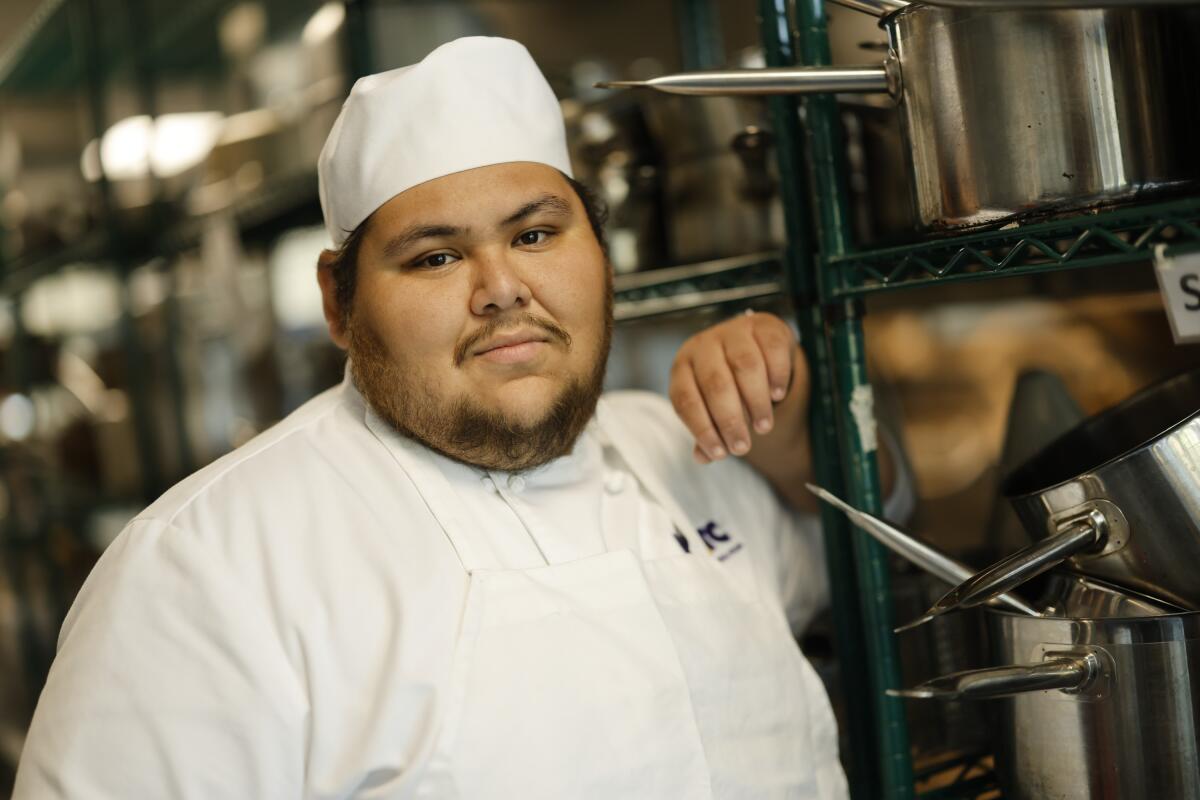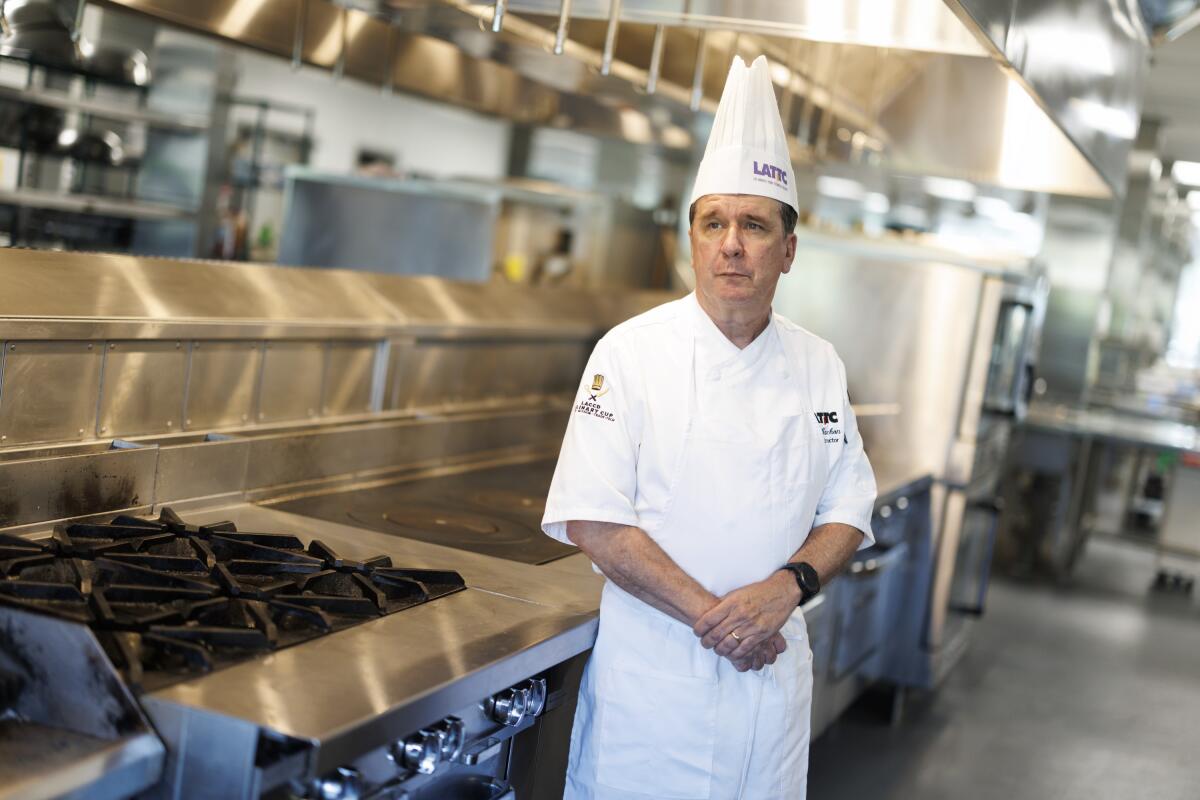It has been a brutal stretch for L.A. restaurants. Since 2023, hundreds of notable spots have shuttered amid escalating costs for food and labor, and a weakening economy.
More recently, the local scene has also been roiled by the January wildfires, which torched several restaurants, caused some to temporarily close and displaced workers. Then, this summer, federal immigration enforcement raids led many undocumented workers to leave their posts over fear of detainment.
It’s a dicey environment in which to launch a restaurant industry career. But Los Angeles Trade-Technical College’s culinary program tells a different story — enrollment grew by 13% last academic year, and it is up nearly 30% since 2019.
Jerry Vachon, chair of L.A. Trade-Tech’s culinary program, examines grapes at the school’s garden.
(Carlin Stiehl / Los Angeles Times)
The program’s growth comes as culinary schools have also been closing over the last decade: Le Cordon Bleu shut down its colleges across the country, including a Pasadena branch, in 2017; and a handful of other notable ones closed in 2020 amid the COVID-19 pandemic.
Recent Trade-Tech culinary graduates — and the instructors who taught them — said that they are not surprised by the school’s success, explaining that the program has appeal, in part, because it teaches useful, real-world skills in a new, modern building.
“Going to school is super important — I tell that to the young cooks we have,” said Trade-Tech culinary graduate Katya Shastova, the chef-partner of Vin Folk, a well-reviewed Hermosa Beach restaurant that opened last year. “Some people think you can learn in the kitchen. Yes, you can. But when you come into a kitchen with techniques that are already embedded in you … it puts you on a different level.”

Robert Wemischner is a longtime instructor at L.A. Trade-Tech’s culinary school.
(Carlin Stiehl / Los Angeles Times)
Longtime instructor Robert Wemischner said the program emphasizes giving “students a real-life view of the work that they will be doing in the field.”
“Even at a point when the landscape is bleak, or rather uncertain … the students wish to find a career, pursue a passion,” he said. “And they find teachers who fuel that.”
There are other factors, too. Department Chair Jerry Vachon said the program may be benefiting from a post-COVID-19 bump, as people rethink their careers. The Los Angeles College Promise initiative, launched about a decade ago by the Los Angeles Unified School District and the L.A. Community College District, has also helped. It provides two years of tuition for select graduating high school students at the college district’s nine schools, Trade-Tech among them.
Vachon projects future growth for the culinary school, which offers certificates and associate’s degrees, through the creation of new topics of study. Trade-Tech will begin awarding a certificate in plant-based cuisine starting this fall. The program is also aiming to provide certificates in food trucks and mobile vending by 2026. Both increasingly popular areas have lower barriers of entry than restaurants.
Why students enroll
The roughly $50-million Culinary Arts Building, which opened in summer 2021, is a showcase facility that transformed the program, Vachon said. On a recent tour, he showed off a garden used by a new class in green technology, and a cavernous room that included 12 mini-kitchens and was stocked with gleaming stainless steel appliances.
Many students, he said, “really haven’t experienced” using the sort of high-end equipment that the school provides.
The building’s large main kitchen accommodates multiple classes, among them production baking and butchery. Vachon, who long taught a class on charcuterie — “we do pâtés, terrines,” he said — was particularly proud of the dry-aging refrigerators, where salami hung. It is near the campus coffee bar, whose offerings are prepared and sold by students.

Raul Gonzalez pivoted from mathematics to L.A. Trade-Tech’s culinary program three years ago. He received his associate’s degree in culinary arts this spring.
(Carlin Stiehl / Los Angeles Times)
Students who recently completed the program said the facilities had wowed them. Raul Gonzalez, 26, said he was studying mathematics at Trade-Tech, but left after an epiphany during a calculus exam: “I don’t want to do this for the rest of my life.” He pivoted to the culinary school three years ago, and received his associate’s degree in culinary arts this spring.
“I always had passion for cooking. It finally clicked for me,” said Gonzalez, who is now working toward his associate’s degrees in baking and restaurant management, and works at the school’s coffee shop during the summer. He hopes to open a restaurant in Guatemala, where his parents are from.
Sandy Hernandez, 19, said that baking had been a hobby in high school — but she wanted to develop her skills. She enrolled in the school’s baking program in 2023. Hernandez, who earned her certificate this spring, has already found a job preparing custards and other items for a cafe and caterer.
For many students, it’s helpful that the program is relatively affordable: Vachon said that students can get their certificate or degree for roughly $3,500 to $5,000, depending on the route they choose. By comparison, it costs $22,105 a semester to attend the Culinary Institute of America’s outpost in St. Helena, Calif.
What the graduates say
Graduates of Trade-Tech’s culinary program said it prepared them well for their careers.
Ricardo Mora, 34, left a job in sales about a decade ago and enrolled at Trade-Tech with the goal of becoming a pastry chef. He earned certificates from the baking and culinary programs in 2017 and 2018, and worked for about three years as a pastry cook, with a stint at SLS Hotel in Beverly Hills.

Sandy Hernandez is a recent graduate of Trade-Tech’s culinary school. She has already found a job preparing custards and other items for a cafe and caterer.
(Carlin Stiehl / Los Angeles Times)
Eventually, though, he tired of it, and pivoted to food photography in 2020. What he learned at Trade-Tech has helped him in this new venture.
“I spent years working hands-on with food, knowing how food should be presented to people,” said Mora, who is from South Gate. “I can help [clients] make sure the food looks perfect for a photo.”
Another graduate, Eric Warren, 72, also used his Trade-Tech experience to launch a culinary career in his late 50s. After graduating in 2011, he debuted the Ooo-We! sauce, a “sweet, spicy, saucy glaze” that he said pairs well with everything from eggs to pork tenderloin. His path has been unique, but he believes that the culinary program turns out versatile graduates.
“You may start flipping hamburgers, but you may end up being a specialist in caviar,” Warren said. “Everybody’s gotta eat.”

Jerry Vachon, chair of L.A. Trade-Tech’s culinary program, also teaches there.
(Carlin Stiehl / Los Angeles Times)
Shastova, 34, the chef at Vin Folk, which The Times said last month was “the most exciting restaurant to open in the South Bay in recent memory,” is among that program’s most visible recent graduates.
A Russian immigrant, Shastova came to the U.S. in 2011 and settled in New York before eventually relocating to Los Angeles. Pondering her next move, she thought about her mother’s bakery back home.
“I figured I already knew how to do that,” she said with a laugh. “Then I found Trade-Tech.”
She graduated with a certificate in culinary studies in 2017.
In a further testament to the value of a Trade-Tech culinary education, two other graduates with whom Shastova attended the school found jobs at a well-reputed L.A. area restaurant.
They’re line cooks at Vin Folk.









